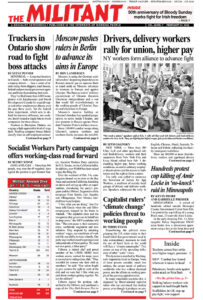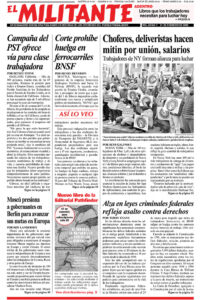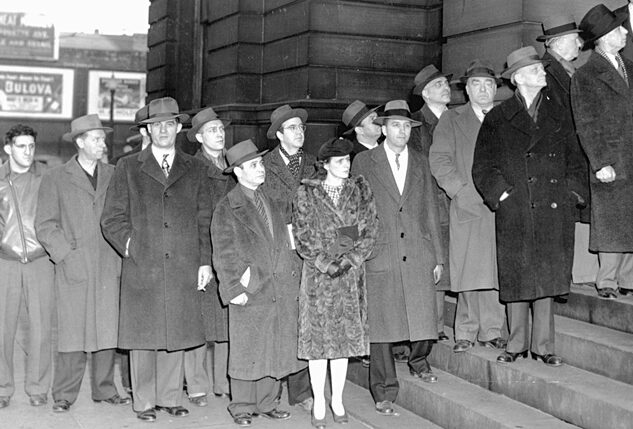The Socialist Workers Party in World War II: Writings and Speeches, 1940-43 by James P. Cannon, is one of Pathfinder’s Books of the Month for February. Cannon, a founding leader of the SWP, was framed up in 1941 and imprisoned along with 17 other SWP and Minneapolis Teamsters union members for opposing Washington’s imperialist war aims. The excerpt below, written a year before Washington entered the war, is from Cannon’s Nov. 30, 1940, Socialist Appeal article, “Militarism and workers’ rights.” Copyright © 1975 by Pathfinder Press. Reprinted by permission.
Our resolution on military policy … says: “The imperialist war is not our war and the militarism of the capitalist state is not our militarism. … We are against the war as a whole just as we are against the rule of the class that conducts it, and never under any circumstances vote to give them any confidence in their conduct of the war or preparations for it — not a man, not a cent, not a gun with our support. Our war is the war of the working class against the capitalist order.” …
[D]espite our opposition, we have the militarism and tomorrow we will have the war in full scope. That does not change our principle, but it imposes upon us a certain line of tactics since we do not want to remain aloof as mere oppositionists. We do not rest content with general opposition to capitalism and general advocacy of the socialist revolution and simply repeat our ultimate aims as a set of soul-saving formulas. … The problem of the hour is to find a realistic basis for our irreconcilable class agitation in the arena of war and militarism which now, and for a whole epoch, will dominate the world. This is the aim of our resolution on military policy.
Our military program is intended as a program of agitation. In order to be effective such a program must take into account not only the objective circumstance (the epoch of militarism), but also the present consciousness and mood of the workers. The American workers are against war, they are fearful of war, yet they are convinced in their bones that it is unavoidable and that the millions of young men who are being drafted and sent up for military training are destined to be cannon fodder. …
The workers like to hear the promises of Roosevelt and Willkie that American boys will not be sent into foreign wars, but the great mass of them do not believe a word of it. Neither do they believe the isolationist and pacifist liars who say it is possible under capitalism to “keep America out of war.”
The workers are profoundly impressed by the fate of the European countries which have been overrun by Hitler’s army. They hate and fear fascism. So far they see it incarnated only in the foreign foe, and they are ready if necessary to go to war against it, especially if the war is presented to them, as it surely will be, in the guise of “defense” against a “foreign” attack. Facing the prospect of war it is obvious to the serious-minded workers that military training is needed. That is why they submitted universally to conscription; without enthusiasm, it is true, but also without any serious opposition. This attitude of the rank and file of the American working class is a thousand times more practical and realistic than that of the pacifist muddleheads who proclaim the necessity of socialism and yet oppose compulsory military training — in a world gone mad with militarism.
Our military resolution takes the foregoing circumstances, objective and subjective, as its point of departure and attempts to show the workers how to carry on their daily struggle against the bosses over into the new field of militarism.
The American workers have made great advances in the last six years. Millions of new recruits have been drawn into the trade union movement for the first time. They have had to fight every inch of the way to gain the smallest concessions, and then to fight all over again, and continuously, to keep them. In the course of these fights the workers have developed a fervent devotion to their unions. They have learned to hate and distrust the bosses who directly exploit them and the police and local authorities who help the bosses.
In strike after strike the militant American workers have demonstrated that they have no fear of direct clashes with these local authorities and police. But in their overwhelming majority, the workers still think of the national government as something different. They respect it and at the same time they fear it as a remote power, which cannot be combatted. …
“You can’t strike against the government” — this is not only the dictum of Roosevelt, but also the feeling of the great majority of workers at the present time. … These illusions of the workers are the ace card up the sleeve of the American imperialists. …
[T]he workers express the mistaken opinion that the class struggle ends when they leave the arena of the union and the factory and enter the new arena of war and militarism. They do not anticipate in advance the tremendous new experiences which are destined to make such a powerful impression on their minds, and that in a comparatively short time. … War and militarism will uproot the workers from the old environment in which their present convictions were formed, impose new and terrible experiences upon them, and compel them to think in new terms.
The workers have yet to learn that the government, which now appears as a sacrosanct institution standing above the classes, is in reality the executive committee of all the bosses. Experience under the conditions of militarism and war, aided by our agitation, will teach this necessary lesson in the coming period. In the course of these developments our program, if we present it with simplicity and clarity, will not only have success in an “agitational sense”; the awakening workers will pass over its extremely modest and elementary demands as advancing troops pass over a bridge to a new point of vantage. …
In the army of conscription the situation will be radically changed. It will consist of millions of young workers — the proletariat in arms! They are accustomed to certain rights. Their mighty numbers will confer a sense of power upon them. It will not be possible to treat them like cattle for any length of time without creating a profound discontent in their ranks.


